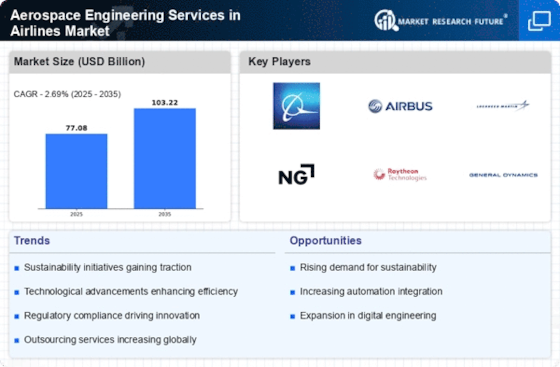Top Industry Leaders in the Aerospace Engineering Services Airlines Market

Companies Covered
Altran (France)
Alten Group (France)
AVL (Austria)
Tata Consultancy Services Limited (India)
Wipro Limited (India)
Accenture PLC (Ireland)
Akka Technologies (Belgium)
Thompson Aero Seating Ltd. (UK)
Happiest Minds Technologies (India)
HCL Technologies Limited (India)
Strategies Adopted
Current investment trends in the Docking Systems industry underscore a focus on research and development, product diversification, and market expansion. Key players are directing investments towards developing next-generation fender systems, automated mooring solutions, and predictive maintenance tools for docking infrastructure. Investments in digital twin simulations, IoT sensors, and cloud-based platforms are prevalent, reflecting the industry's shift towards data-driven decision-making and asset management. Additionally, strategic investments in sustainability initiatives, such as eco-friendly materials and energy-efficient technologies, aim to align docking system solutions with evolving environmental regulations and customer preferences.
The overall competitive scenario in the Docking Systems market is characterized by established manufacturers, technology providers, and service integrators, each navigating the industry with distinct strategies. Market share analysis considers factors such as product performance, innovation capabilities, customer relationships, and global reach. The industry's responsiveness to technological advancements, customer feedback, and market dynamics further shapes competitiveness. As port infrastructure continues to evolve to meet growing maritime traffic demands, companies in this sector are focused on delivering reliable, efficient, and sustainable docking system solutions that enhance port efficiency, safety, and environmental stewardship.
Emerging Companies
As the demand for docking systems continues to rise, new and emerging companies are entering the market, contributing to innovation and product development. Start-ups and specialized firms such as ShibataFenderTeam AG, JIER Marine Rubber and Engineering Co., Ltd., and Mampaey Offshore Industries BV are gaining recognition by providing novel docking solutions tailored to specific port and vessel requirements. These companies leverage expertise in materials science, engineering design, and maritime technology to develop resilient fender systems, quick release hooks, and automated mooring solutions that improve port operations and vessel safety. The industry is witnessing a trend towards the development of integrated docking systems, smart monitoring solutions, and eco-friendly materials, aligning with the broader maritime industry's sustainability goals.
Industry news within the Docking Systems market reflects ongoing trends, regulatory changes, and technological advancements driving the sector forward. News related to successful docking system installations, port expansion projects, and advancements in mooring technology showcase efforts to enhance port infrastructure and operational efficiency. Moreover, developments in docking system standards, safety guidelines, and environmental regulations are frequently covered in industry news, highlighting the importance of compliance and risk management in port operations. Additionally, news related to industry conferences, exhibitions, and trade shows underscore the collaborative nature of the docking systems market and the knowledge-sharing initiatives aimed at fostering industry innovation and best practices.
Recent News
Collins Aerospace (USA):
Focus on Integrated Data Analytics and Performance Solutions: Collins offers cloud-based data analytics platforms for airlines to optimize maintenance schedules, fuel consumption, and flight routes, improving cost-efficiency and performance.
Partnership with Boeing: Collins collaborates with Boeing on developing digital and health monitoring solutions for next-generation aircraft, enabling predictive maintenance and preventing operational disruptions.
GE Aviation (USA):
Emphasis on Advanced Engine Maintenance and Repair Services: GE Aviation provides engine overhaul and repair services for airlines, extending engine lifespans and reducing operational costs.
Focus on Engine Performance Optimization: GE develops software and data-driven solutions to optimize engine performance and fuel efficiency for specific airline routes and operating conditions.
Honeywell Aerospace (USA):
Focus on Integrated Avionics and Flight Management Systems: Honeywell supplies and services advanced avionics and flight management systems for airlines, enhancing safety, navigation, and communication capabilities.
Emphasis on Cabin Management and Entertainment Systems: Honeywell offers airlines innovative cabin management and entertainment systems, improving passenger comfort and onboard experience.
Lufthansa Technik (Germany):
Focus on Comprehensive MRO (Maintenance, Repair, and Overhaul) Services: Lufthansa Technik provides a full range of MRO services for various aircraft types, caterting to the diverse needs of airlines worldwide.
Emphasis on Sustainability and Green Technologies: Lufthansa Technik invests in research and development of sustainable MRO practices and technologies, aiming to reduce the environmental impact of aviation operations.
Safran Aircraft Engines (France):
Focus on Collaborative Engine Development and Design: Safran collaborates with major aircraft manufacturers on the development of new engine technologies, offering airlines advanced, fuel-efficient engines for their fleets.
Emphasis on Advanced Maintenance and Diagnostic Tools: Safran develops innovative maintenance and diagnostic tools for airline operators, facilitating early detection of potential issues and minimizing downtime.
Emerging Trends in Aerospace Engineering Services in Airlines Companies:
Increased adoption of data analytics and digital solutions for predictive maintenance and performance optimization.
Focus on collaborative partnerships between airlines, engineering services providers, and aircraft manufacturers for technology development and deployment.
Emphasis on sustainability and green technologies, including fuel-efficient engines and alternative fuels.
Growth of digital twins and virtual prototyping for streamlining aircraft design and maintenance processes.
Increased demand for specialized engineering services for customized airline solutions and advanced aircraft modifications.











